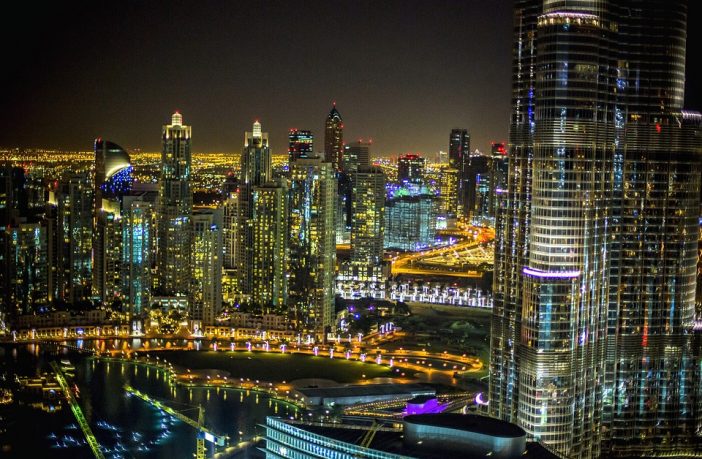The lure of a luxury lifestyle on the pure, white sands of the Middle East means that many Brits have considered upping sticks and moving to Dubai.
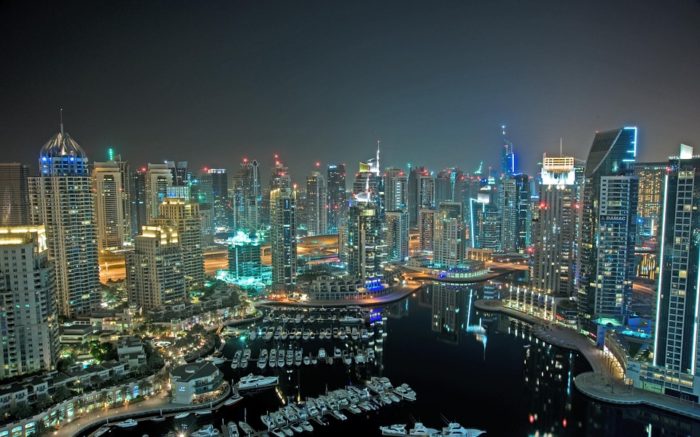
Thinking about moving to Dubai?
There’s much more to this tax-haven than meets the eye, however, and a better quality of life is just one reason.
Dubai is the second largest emirate in the United Arab Emirates (UAE), after the country’s capital, Abu Dhabi.
If you’re thinking about a move to Dubai from the UK, here’s what you need to know.
Contents
Why Move to Dubai?
Dubai is one of the world’s top hubs for expats, thanks to its status as an (almost!) tax-free emirate that combines both the glitz and glamour of a huge, metropolitan city, with the serenity and beauty of the beaches on its doorstep.
Shopping, fine dining and a luxury nightlife scene attract expats from all over the world who are looking for a place to enjoy the finer things in life.
Compared to the dull skies of the UK, Dubai is blessed with a tropical climate and seemingly permanent sunny skies thanks to its position near the Tropic of Cancer.
Personal crime rates are low in Dubai, and expats are quick to note that they feel very safe in the Emirate, with a visible and friendly police presence.
You can raise a family here, easily assimilate into a community and even buy property and land — something usually restricted for foreigners in the Middle East.
While the official religion of Dubai is Islam, expats are generally able to lead relaxed lifestyles as long as they respect and abide by the local laws and customs.
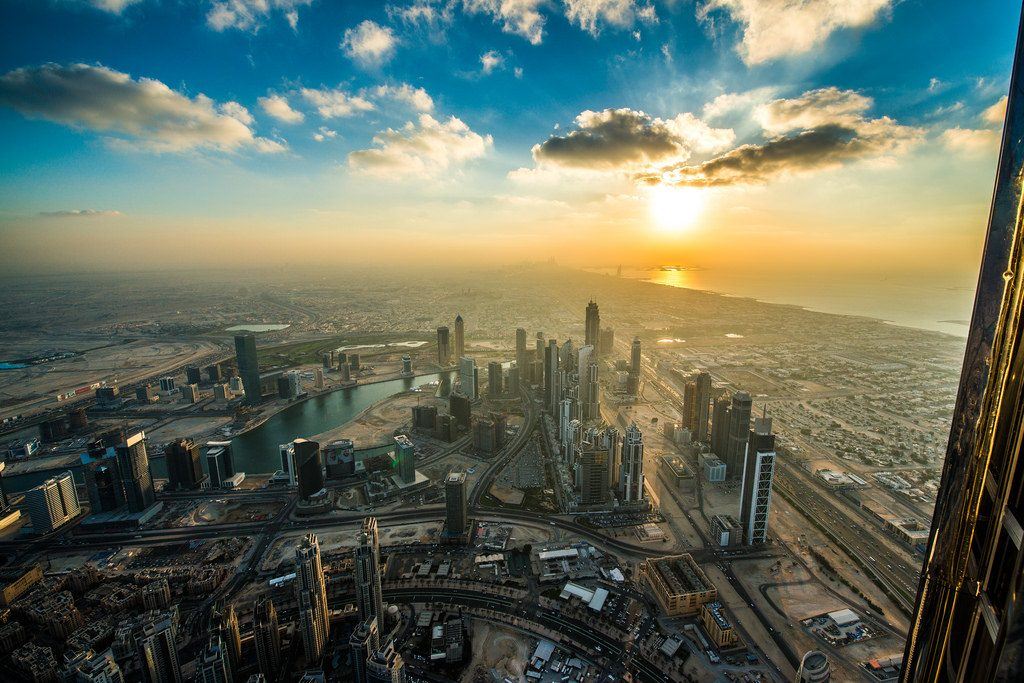
By Simon Bierwald (CC BY-SA 2.0)
Dubai Visa Requirements for Brits
Visiting
British citizens are granted a Visit Visa free of charge on their arrival into the UAE. This allows for a stay of 30 days (which can be extended by another 30 days towards the end of the validity once you’re in Dubai).
You must have a return ticket out of Dubai as well as six months minimum validity on your passport.
There is also an option to apply for a Multi-Entry Visa to Dubai, which will be of particular interests to Brits who fly in and out of the UAE often (and is most often granted to Brits doing business with Dubai companies). This is valid for 6 months, but only for stays of up to two weeks at a time. You can apply for this at the UAE Embassy in London for a fee of £400.
Working
If you intend on working in Dubai, your employer will be your ‘sponsor’ and they will arrange a work permit and employee residency visa for you. When you initially arrive in the emirate, you should work with your company to procure a probationary three-month work permit which will allow you to start work immediately.
Foreigners working without a work permit or on a Visit Visa risk being fined, deported and even jailed.
The length of an employee residency visa will depend on the length of your employment contract. In order to apply for this type of visa, you will need to take a blood test for HIV and Hepatitis — if you’re found to have these diseases, you will be detained and deported without appeal.
Once your residency visa has been granted, your employer will be able to help you apply for a Labour Card (work permit). This must be cancelled before you permanently leave Dubai otherwise you could be reported as an absconder and arrested upon a future entry into the UAE.
Visa fees are usually met by the employer.
If you wish to start your own business in Dubai, you will need to obtain a trade licence from the Department of Economic Development, through a local service agent who will act as sponsor.
British citizens and, indeed, any non-nationals of the Gulf countries are not allowed to be majority shareholders of any business outside of the UAE’s free zones so you should look into this carefully before starting a business in Dubai. Consult your local UAE embassy or take a look at the government portal website.
Other types of visa
Your employer should be able to advise you on how to procure residency visas for your family to join you in Dubai, although note that there is a minimum monthly salary requirement of AED 4,000 (£810) that you must earn before this is possible. If you want to sponsor your parents to join you, there is a minimum monthly income requirement of AED 10,000 (£2,000).
Your family should enter the UAE on an entry residence visa and apply for a residence stamp within 30 days of their arrival.
Long-term visas are also available for students taking up study in Dubai and reportedly, investors, although information on this is scant. Talk to your local UAE embassy to find out more.
Citizenship
It is incredibly difficult to become a naturalised citizen of the UAE, with the only likely route — that’s not remotely guaranteed — being 10 years of marriage to a Dubai national. Muslims are more likely to achieve this than non-Muslims.
If you have children with a fellow Brit while living in Dubai, those children will assume British citizenship and not have rights of local citizenship.
There are various implications involved in having children while in Dubai that you should fully acquaint yourself with when choosing to do so.
Way of Life in Dubai
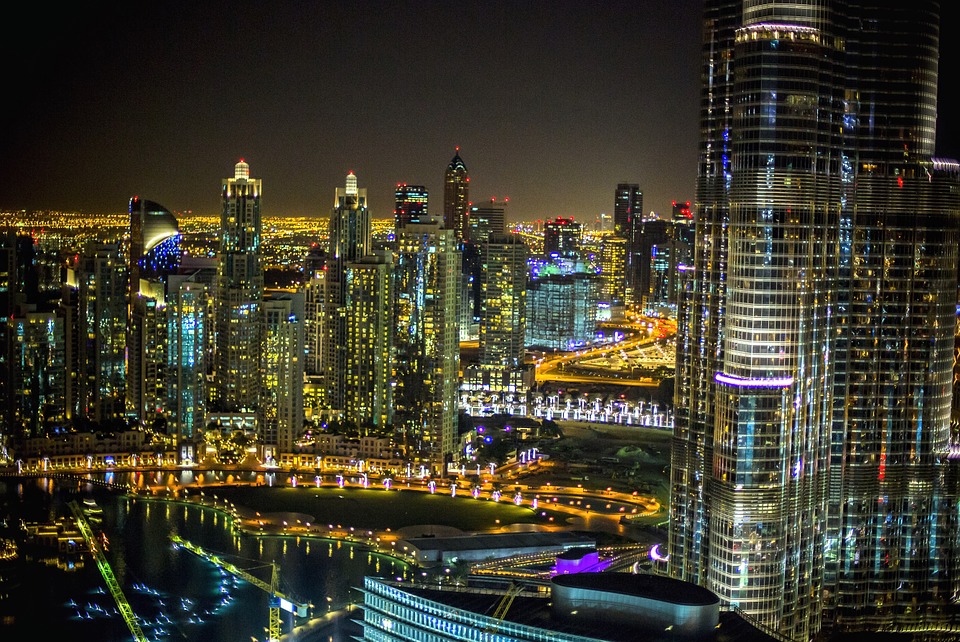
As an expat in Dubai, you certainly won’t feel like a minority; on the contrary, over 80% of the people living in the emirate are expats!
Most of these people are from other countries in Asia, but there’s also a sizeable Western population too, including fellow Brits. English is spoken everywhere and there’s a real sense of Dubai being a cultural and cosmopolitan melting pot.
Lifestyle
Despite Islam being the state religion, much of Dubai is designed for the enjoyment and lifestyle of its more liberal expats.
The shopping in Dubai is legendary, with reams of glitzy, air-conditioned malls to explore, while the nightlife is not as restricted as you might expect in a Middle Eastern country.
Alcohol carries a 30% tax, and is generally sold in hotel bars as there are extensive liquor licensing laws. Regardless, the nightlife scene is vibrant and well-patronised as expats and visitors make the most of what’s on offer. Many of the biggest hotels have a number of bars, lounges and even clubs to cater to the party animals!
International restaurants are two-a-penny in Dubai and again, thanks to the licencing laws, are particularly well attended in the emirate’s hotels. Emirati cuisine, however, is quite thin on the ground and might be only something you experience at the home of a local.
For those that like cooking themselves at home, there are supermarkets of varying sizes to be found throughout the city and its suburbs (although you can’t buy any alcohol in them). There’s even Waitrose!
Dress
As you would expect in a Muslim country, Dubai is home to plenty of mosques, and many Emirati citizens proudly wear their national dress — although foreigners are not expected to do this.
Although foreign women are not obliged to wear the hijab and abaya, it is wise to dress reasonably modestly out of respect anyway — don’t wear clothes that show off your bare tummy, back or thighs, for instance. Ideally, women should cover their shoulders and up to their knees, and perhaps bring a shawl to wear around them in the malls.
Getting around
Whether you choose to drive your own car or take taxis, it’s hard not to notice the traffic congestion in Dubai, particularly during rush hour. There is an above-ground metro system, water taxi and a bus network, which many workers rely on too.
Taxis are metered and cheap, while women on their own can take advantage of the Ladies’ Taxi service, driven by a female driver and noticeable by their pink roof.
If you’d prefer to walk, feel free — Dubai is known for being a very safe and clean city with a strong police presence and plenty of footpaths and bridges for pedestrians. The only thing which may deter you is if it’s very hot…
Weather
Dubai sports a tropical climate which varies between being beautifully temperate and sunny, to incredibly humid and uncomfortably hot.
Peak summer is between May to September, with average highs going up above 40°C and some incredibly humidity.
December to March will see some rainfall, although these storms are usually short and sharp, and paired with temperate warm weather.
Cost of Living in Dubai
One of the main benefits for many people moving to Dubai is the fact that they won’t be paying any tax on their wages, and sales tax is generally minimal across the board too.
While that can equal big savings, there are a few areas where you’ll probably find yourself spending more in Dubai than you would have done at home.
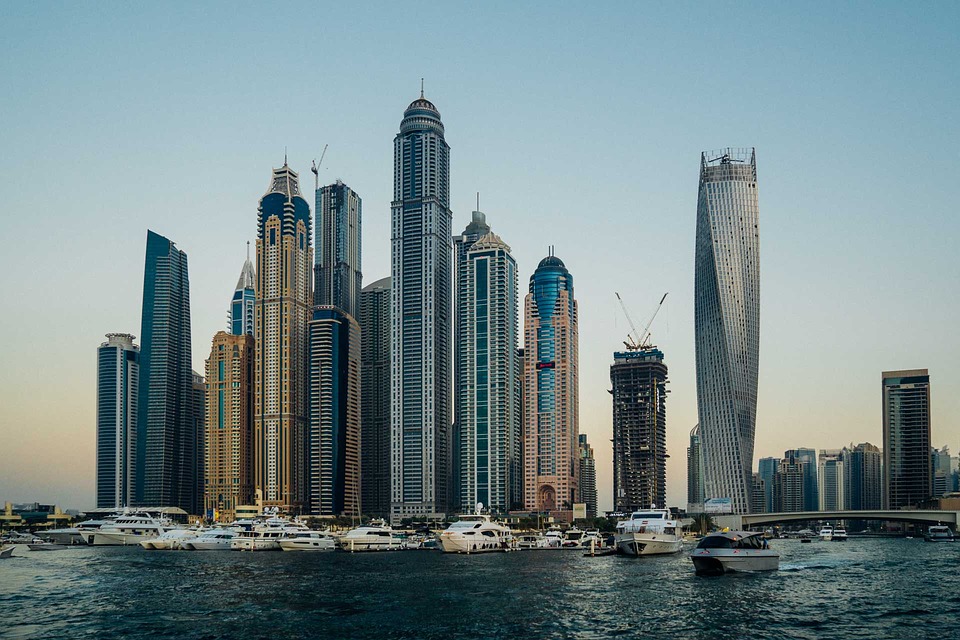
Of course, cost of living — whether in Dubai or elsewhere — will vary hugely according to your lifestyle needs. It’s possible to live an incredibly lavish lifestyle in a penthouse apartment complete with maids and a rooftop swimming pool, but a small, modest lifestyle can be enjoyed in the suburbs for a lot less too.
Rent
If you’re moving to Dubai from London then rent prices probably won’t surprise you too much — although they may be a sharp uptick if you’re used to regional UK prices.
According to Numbeo, the average monthly rental for a one-bedroom apartment in the city centre is AED 7,641 (£1,552), rising to AED 15,138 (£3,074) for a three bedroom.
Prices decrease the further away you move from downtown hotspots, while luxury hubs in premium locations like Palm Jumeirah will attract a much loftier price tag.
There is something of a rental slowdown in Dubai right now and prices appear to be dropping rapidly — by up to 10% this year, reportedly — so you may be able to score a relative bargain.
Explore Dubizzle for rental opportunities, which can be searched for by price and neighbourhood.
It’s very easy to buy property in Dubai as a foreigner, which may be attractive to those preferring to buy bricks rather than churn out money in rent. Make sure you understand the market and yield potential before you jump in.
Lifestyle
This is probably the area where many Brits are likely to spend more than they would do back in the UK as there’s so much to offer by way of shopping, dining and nightlife.
While sales taxes are generally minimal, there is a high alcohol tax, so nights out partying can quickly add up — particularly if you’re hanging out in the luxury hotels.
Most shopping is tax-free, so prices are likely to be lower than at home — it’s just that you’ll likely be buying a lot more than you would back in the UK as a result!
There are a lot of Western brands you’ll recognise in Dubai’s malls, ranging from the high-end to the more affordable; Harvey Nichols and IKEA, for instance.
Designer clothing stores dominate the luxury malls, although you’ll also find plenty of more day-to-day shops too: Banana Republic, H&M, Topshop and Zara, for example.
Those really in search of bargains should look to the traditional souqs that can still be found in the corners of the city, which sell everything from spices and fabrics to jewellery and vegetables. Just remember that there’s no air-conditioning!
Transport

Taxis are cheap and on the meter, while the Metro and bus system are perfect for those on a tight budget. A single ticket costs an average of AED 5 (£1).
Many people that move to Dubai choose to buy their own car, in order to give them freedom to travel wherever they want across the emirate and beyond.
UK driving licence holders can easily convert their licence to a UAE one without a road test, which you can do by the government portal here.
If you have a residence visa, you can either buy a second-hand car, which are commonly advertised online and in local media, or a new one. If you do buy a new car, bear in mind that the UAE has a sole agency law binding you to the dealer where you bought it for all future servicing. If you go elsewhere to save money, you will void your warranty.
Cars are marginally cheaper than they are in the UK, although prices obviously vary by model and by usage. A new VW Golf with 1.4 engine is around AED 75,000 (£15,200) new.
Petrol is a lot cheaper than in the UK thanks to the UAE being such an oil-rich country. A litre of regular, unleaded 91 octane petrol costs around AED 1.72 — that’s just 35 pence!
Schooling
There are over 150 private schools in Dubai, including some excellent UK international schools.
Costs vary hugely per school and per year group, but private education in Dubai is generally considered to be very expensive. You can see a total breakdown of fees per school and year group here.
Yearly fees at the Dubai British School for pupils in Year 7, for instance, were AED 55,886 (£11,350) in 2015. Tuition can reach as high as AED 98,650 (£20,000) per year at some schools.
Popular Areas for Brits
If you’re moving to Dubai from the UK, chances are you want to live in an area with other British, or at least Western, expats.
As the traffic can be so bad in Dubai, you should also choose the neighbourhood you want to live in based on how close you want to be to your work and your children’s school, if applicable.
There are lots of popular neighbourhoods throughout the Emirate; here are a few of the most notable.
Downtown Dubai
Home to the tallest building in the world, the Burj Khalifa, downtown Dubai is the area for city dwellers who like to be in the thick of the action.
You’re likely to be apartment living here, and eager to take advantage of the Dubai mall and the trendy nightlife scene. Downtown is also nearby the International Financial Centre, so is home to a lot of financial high-flyers.
Palm Jumeirah
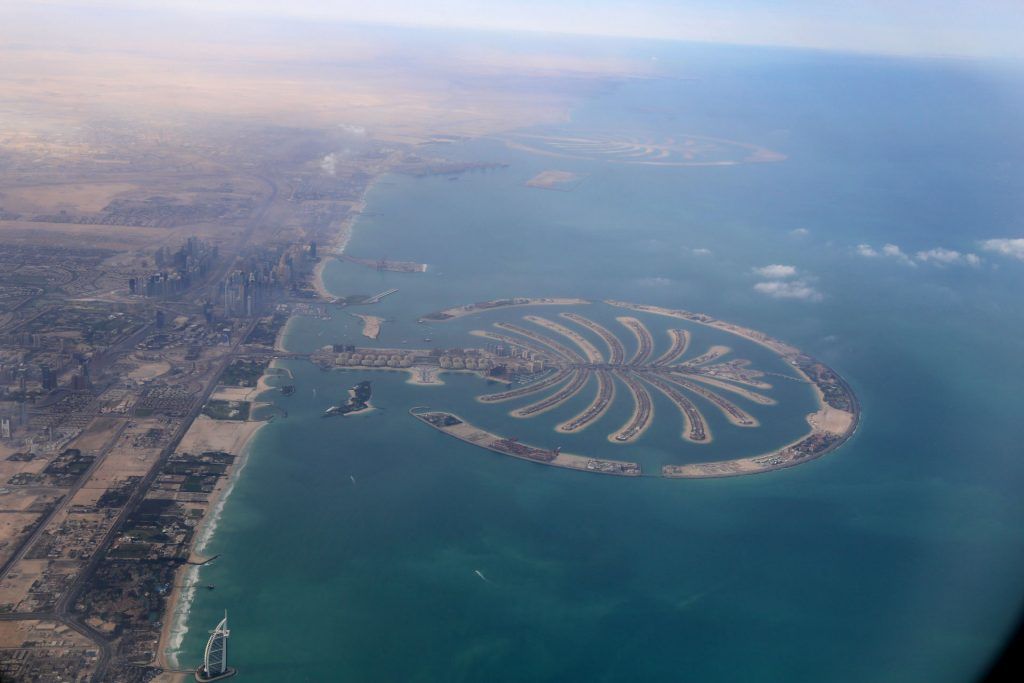
The Palm (By Skatebiker CC BY-SA 4.0)
The Palm is one of the most iconic images of Dubai — a man-made island, shaped like a palm, stretching into the Arabian Gulf — and is home to a number of incredible villas and apartments.
It feels very leafy, has direct access to the beach, and some of the pricier residences are blessed with pools. Perfection for those who enjoy the outdoors!
You will need a car if you live at the Palm as the Metro does not yet stretch this far.
Dubai Marina and Jumeira Beach Residences (JBR)
Along the coast of the Arabian Gulf, you have the residential developments of the Dubai Marina and JBR, which are home to some tall high-rises and some premium price tags!
Many of the apartments here sport striking views of the Palm, and you’re also close to the sea and beaches. These developments have a resort-style feel with plenty of restaurants and shops on-site.
There’s plenty of bad traffic in this area so it’s not the ideal neighbourhood for long commutes.
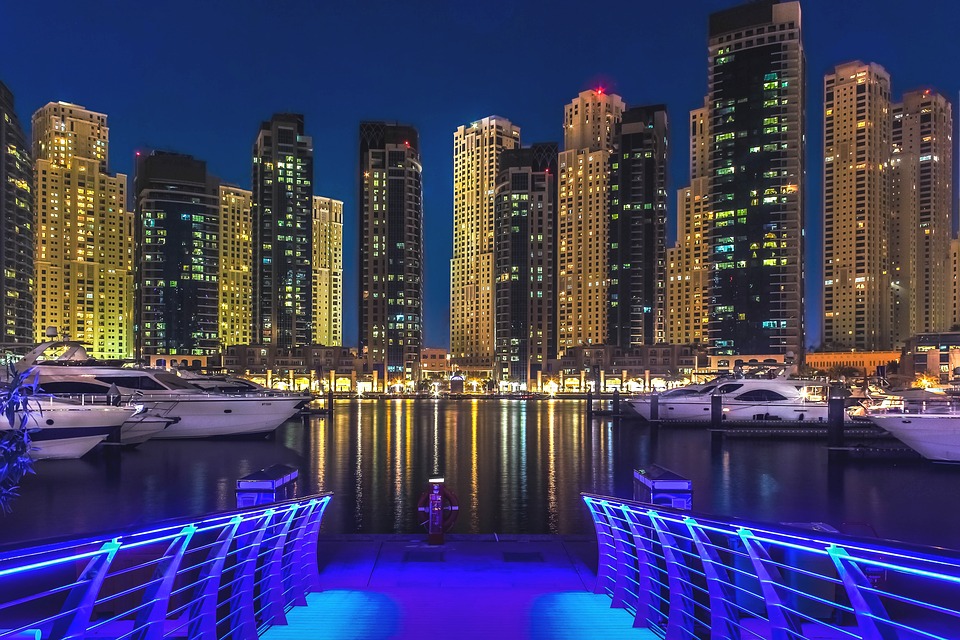
Dubai Marina
Jumeirah and Umm Suqeim
Still very near the beach, the neighbourhoods of Jumeirah and Umm Suqeim offer the older villa style accommodation perfect for families and expats.
Although once the luxury hub of Dubai, Jumeirah has since been overtaken by The Palm and JBR and parts of it are a little run-down now. It’s still in a great location, however, and a good compromise between the central neighbourhoods and those out in the suburbs.
There are plenty of mosques in Jumeirah so you will often hear the call to prayer — you may need to invest in some ear plugs!
Arabian Ranches
Found slightly outside of the city, the Arabian Ranches and similar neighbourhoods like Victory Heights, Motor City, Dubai Silicon Oasis, are really popular with expat families, especially those from the UK and Australia.
These developments are home to townhouses and villas, and are generally much larger than those in the city and coastal developments, offering greater value for money. They’re very leafy, well stocked with amenities, including pools and play areas.
You will need a car if you live out this way, however, as you are in the desert.
Similarly large, the neighbourhoods of The Greens, The Lakes, The Meadows and The Springs are also popular with expats thanks to the comparatively low prices. These developments are slightly more run-down than the Arabian Ranches with less amenities, although much more central.
Other suburban areas that are also worth considering for expats include Mirdif, Al Garhoud, Bur Dubai, Sheik Zayed Road and Rashidya. These will be particularly attractive for those after low rental prices.
British Communities in Dubai
Dubai is so heavily populated with expats that you’ll have no problem making friends and blending into new communities, particularly if you’re working at an international company or have children at international school.
If you need a head start, here are a few communities to help you meet fellow Brits and settle into Dubai:
- InterNations: British Dubai Expats
- Meetup: British Expats in Dubai (17 different meetups)
- Arabian Ranches Ladies
- Scottish Association
- Dubai Irish Society
- Dubai St George’s Society
- Dubai Welsh Society
And some popular blogs and websites:
Dubai Essentials
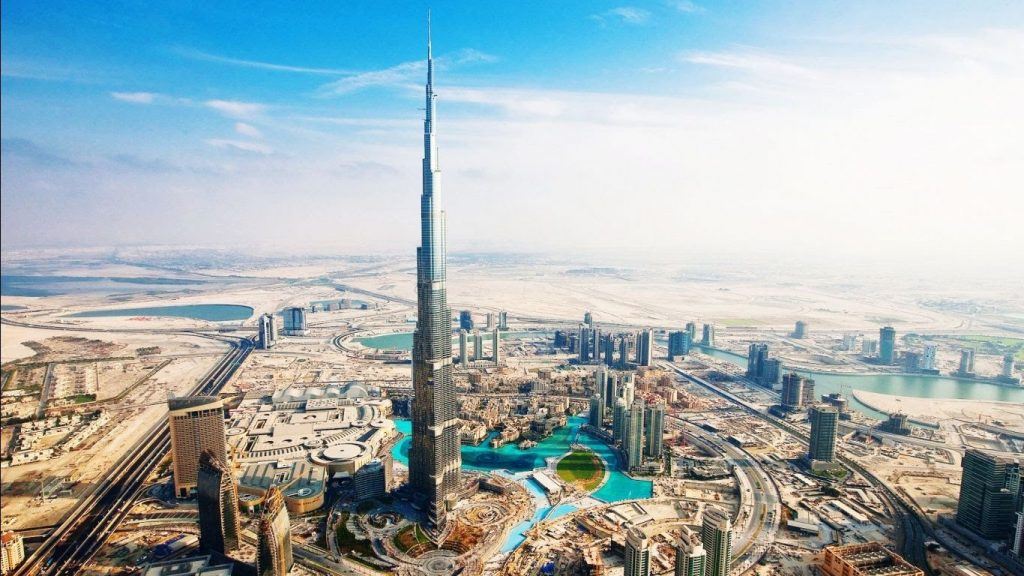
Via Youtube/IntoConnection (Creative Commons)
Jobs Economy
If you’re planning to move to Dubai from the UK, it’s best to make sure that you have a job secured first before you totally upheave your life across continents.
While Dubai was booming with jobs for British expats up to around 2009, there has been a minor slowdown since as the emirate moves into a ‘post-oil’ knowledge based economy.
There are still plenty of jobs to be had, especially in the fields of finance, energy and construction, but it’s best to secure a position prior to moving, especially for high-level careers — if only because you’ll be in a better negotiating position.
Lower and mid-level careers may benefit by already living in the UAE with a residence visa before looking for jobs, as employers like to move people quickly into position after they apply. Of course, it’s difficult to secure a residence visa without a company sponsor and a job, so you may need to be creative.
The healthcare industry is growing quickly and recruiting widely, while the retail, insurance and legal sectors also routinely recruit expats.
Healthcare
Dubai is well known for having an array of excellent hospitals and an international standard of medical staff and facilities — they even have the incredible Dubai Healthcare City, which is exactly what it sounds like, a medical complex the size of a city.
Expats living in Dubai, plus all dependents, are now required to have their own private health insurance to cover all illnesses or injuries sustained in the emirate. Most employees will find this is covered by their employer as part of their expat package.
You will be given a health card from the Health Ministry which you will need to carry with you at all times in order to claim medical cover, and you will be expected to use private hospitals rather than public facilities.
It’s worth noting that some prescription and over-the-counter medicines are not permitted in the UAE, and narcotics cannot be brought into the country at all. Check with the drug control department beforehand if you’re able to bring in a certain prescription from the UK as people have been detained in the past.
Bringing Kids to Dubai
As we covered earlier, there are plenty of private and international schools in Dubai (foreign children can’t attend state schools), and a thriving community of parents with children in the emirate.
Schools are generally of a very high standard and there are lots of opportunities for extracurricular activities. All school children will be required to take Arabic classes while at school.
The highest risk to British children’s health in Dubai is the heat and strength of the sun, particularly in the summer months. Stock up on high-factor sunscreen and make sure to spend plenty of time in the shade and in the air-conditioning.
Many of Dubai’s best malls are equipped with indoor playgrounds, aquariums and other family-friendly attractions, while there are plenty of gardens and opportunities for play outside of the city centre.

